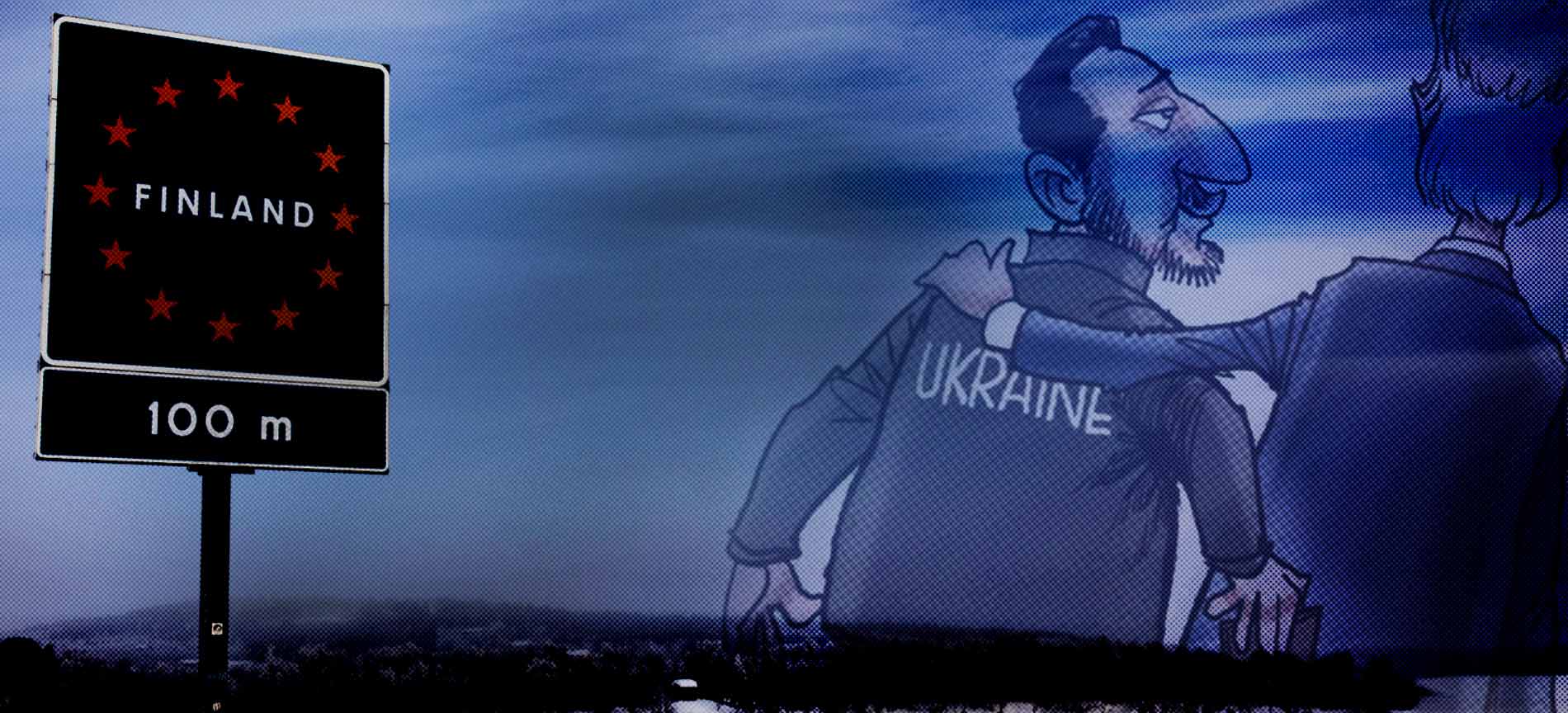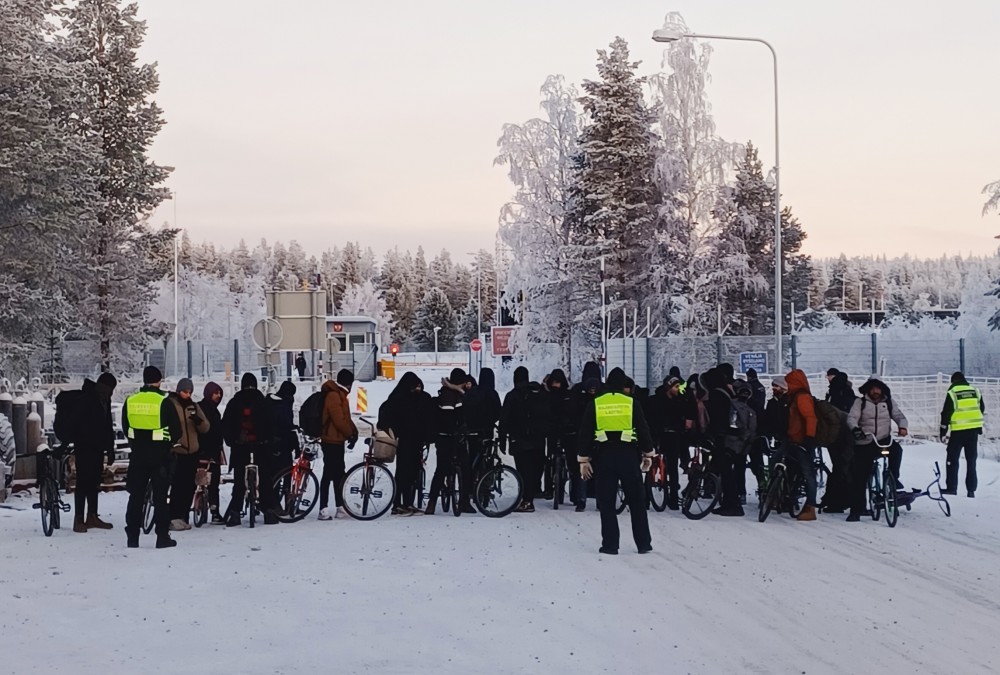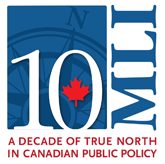In the final month of 2023, Russia continued its efforts to undermine Western support for Ukraine and NATO and engaged in a hybrid operation against Finland by weaponizing asylum seekers.
One of Russia’s primary anti-Ukrainian narratives has been to accuse Urkaine’s government and people of neo-Nazism and corruption. A cartoon published in a Canadian newspaper combined both of these in one editorial cartoon, in which President Zelensky, depicted with an oversized nose to emphasize his Jewish heritage, is pickpocketing President Biden.
Russia Weaponizing Asylum Seekers
According to the Center for European Policy Analysis (CEPA), since August 2023, nearly 900 asylum seekers have been allowed to pass through Russian border controls to Finnish checkpoints without proper documentation.
The Kremlin’s objective is to make Finland – and other targets of its cruel weaponization of asylum seekers – appear indifferent to asylum seekers by rejecting them. This, in turn, is intended to lead to domestic political division and tension among allies. Russian state media, officials and its network of influencers are already exploiting Finland’s decision to temporarily close its borders with Russia to cause domestic political conflict.
Russian state media has manipulated its manufactured crisis to accuse the Finnish government of insensitivity towards migrants. A November 19 Sputnik International article claimed that 8,800 people had signed a petition rejecting Finland’s decision to keep its borders with Russia open.
How Russia Weaponizes Asylum Seekers
Would-be asylum seekers are lured to the Russian border with Finland by promises of assistance to cross into the EU for a small sum. According to a DW investigation, asylum seekers are promised a three-month Russian study visa through registration to participate in a short Russian language course and are then promised transportation to the Finnish border for $1,300.
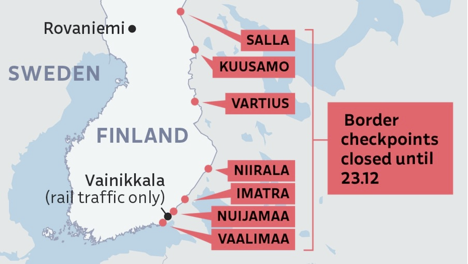
Map of Finnish border crossings: YLE
Minibuses take asylum seekers to the Finnish border where they’re given bicycles (Russian regulations require migrants to cross the border on a vehicle) and guided by Russian border guards to checkpoints. A report posted to Barents Observer on November 20, 2023, said that 35 asylum seekers from Afghanistan, Syria and Iraq, appeared at the border on bicycles in -22 degree weather in the remote Finnish border town of Salla. The nearest Russian town to Salla is Kandalaskh which is 167 kilometers from the border, and much too far for bicycling in such dangerously cold winter weather. After Russian authorities push these asylum seekers across their border, they aren’t allowed to turn back and return to Russia.
Despite these cruel Russian efforts, Finland has ensured the safety of the asylum seekers that Russia is exploiting, by providing them temporary shelter from the -20 to -30 degree temperatures. Asylum seekers who are forced into the grey zone between Russia and Finland are taken to Finnish registration centres where they receive shelter and food while their asylum applications are processed.
Despite Finland’s decision to temporarily close border crossings, Russian facilitators have lied to potential asylum seekers on Telegram, telling them that the border remains open to asylum seekers.
Kremlin Claims Canada is Under The Influence of “Nazis”
In December, Russia’s deputy ambassador to the United Nations, Dmitry Polyanskiy, made wildly baseless claims regarding the influence of neo-Nazi ideology in Canada. He alleged, “Neo-Nazi ideology or nationalist ideology, unfortunately, has a very strong influence in Canada. I think this is obvious.” This statement was quickly picked up and circulated by RT, a Russian state media platform, further amplifying its reach in efforts to discredit the Canadian government and divide Canadians.
Russia’s strategy of labelling critics as “neo-Nazis” is not new. It dates back to WWII and has been a recurring theme in Moscow’s rhetoric. During the Cold War, Central and Eastern European refugee communities in North America were often targeted with this accusation. This tactic aims to discredit and delegitimize their historical experiences.
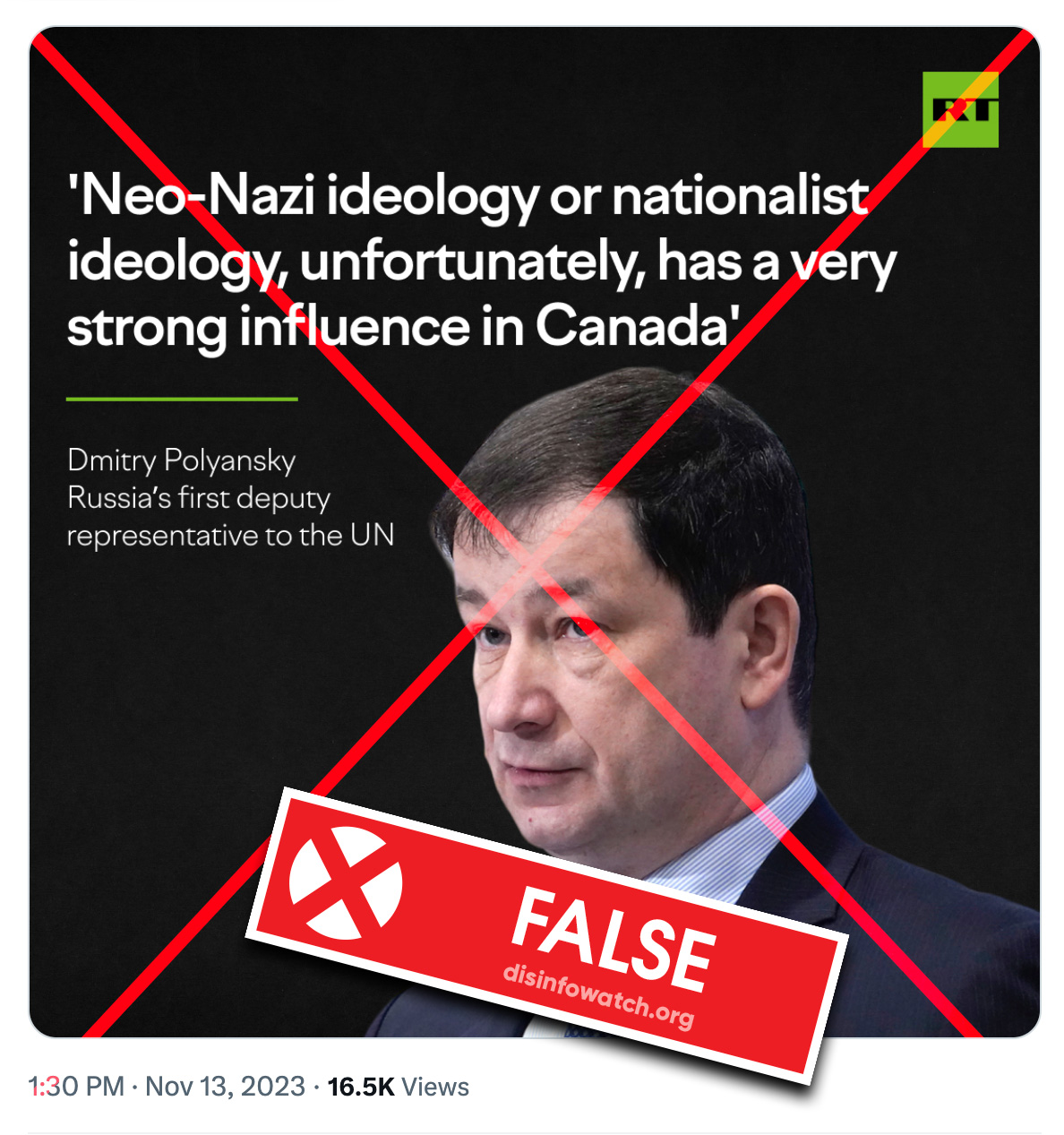 In recent times, the Putin regime employed the same narrative to justify their invasion of Ukraine. By accusing Ukraine’s government and President Zelensky of neo-Nazism, Russia attempts to erode Western support for Ukraine while bolstering domestic support for the war.
In recent times, the Putin regime employed the same narrative to justify their invasion of Ukraine. By accusing Ukraine’s government and President Zelensky of neo-Nazism, Russia attempts to erode Western support for Ukraine while bolstering domestic support for the war.
Contrary to Polyanskiy’s claim, there is no evidence to support the prevalence of such influence in Canada or Canada’s government. The Russian embassy in Canada and individuals affiliated with the Russian government have been propagating this baseless accusation across various media outlets, ranging from the far-left to the far-right, and even infiltrating mainstream publications.
Human rights legal experts, including Yonah Diamond from the Raoul Wallenberg Centre and Norwegian Judge Eric Mose, currently Chair of the UN’s Independent International Commission of Inquiry on Ukraine, have condemned the Kremlin’s anti-Ukrainian propaganda. They argue that the indiscriminate labelling of Ukrainians as “neo-Nazis” constitutes incitement of hate and potential genocide.
The European Union External Action Service Eastern StratCom and the EUvsDsinfo site have reported on Russian neo-Nazi narratives specifically targeting Canadians of Ukrainian heritage. A prominent example is the recurrent disinformation campaign against Deputy Prime Minister Chrystia Freeland, painting her as a Nazi sympathizer based on unfounded allegations about her grandfather’s past.
Despite the circulation of these narratives on pro-Kremlin social media and websites, there is no evidence to support the claims made about Freeland’s grandfather, Michael Chomiak. Post-war accounts indicate that Chomiak was involved with the anti-Nazi resistance, aiding members in obtaining false papers.
Canada’s CBC broadcast this report in 2019 about how Russian State media targeted Canada’s Ukrainian diaspora with this false claim to undermine and dehumanize this community to silence and politically neutralize them.
The Russian government’s attempt to label Canadian figures and communities as neo-Nazis without evidence is a stark reminder of the power of narrative in international relations.
Cartoon Kremlin Aligned Narratives in Canada
On December 21, The Toronto Sun, published a cartoon depicting Ukraine’s President, Volodymyr Zelensky, picking the back pocket of US President Joe Biden. Zelensky, who is Jewish, is depicted with an enlarged and hooked nose, a classic antisemitic trope.
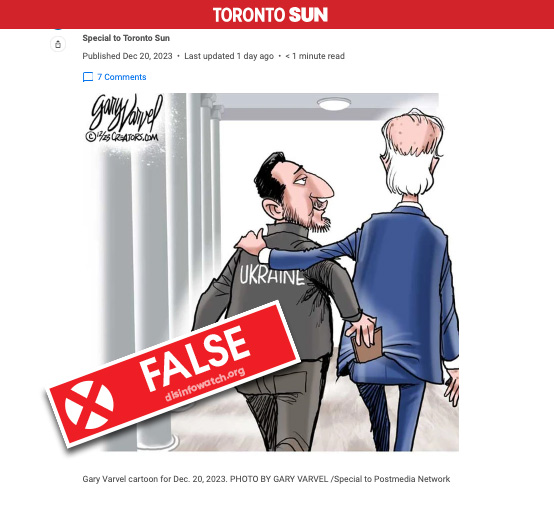 Cartoons depicting Jews as “greedy” with prominent hooked noses have been regularly used in the past to dehumanize and denigrate Jewish communities. This depiction has its origins in “The Protocol of the Elders of Zion”, which specifically alleged Jews conspired to undermine society. The anti-Semitic book was developed by Russian intelligence officers in the late 1800s and was first printed and distributed in Russia.
Cartoons depicting Jews as “greedy” with prominent hooked noses have been regularly used in the past to dehumanize and denigrate Jewish communities. This depiction has its origins in “The Protocol of the Elders of Zion”, which specifically alleged Jews conspired to undermine society. The anti-Semitic book was developed by Russian intelligence officers in the late 1800s and was first printed and distributed in Russia.
The Toronto Sun cartoon connects with and amplifies the Kremlin’s anti-Ukrainian narrative that the Ukrainian people and government are misusing support provided by the West. The cartoon is an extreme example of this narrative, suggesting that Ukraine and its President are stealing from the United States and the Western world.
